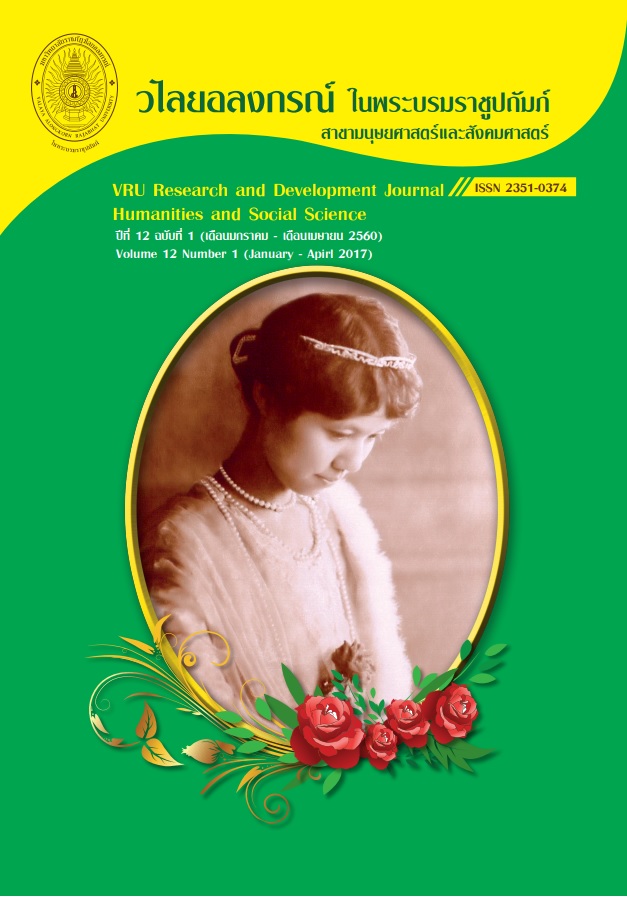ภาวะผู้นำของนายสมคิด จาตุศรีพิทักษ์ กับนโยบายเศรษฐกิจและทิศทางประเทศไทย
Main Article Content
Abstract
การค้นคว้าอิสระในครั้งนี้เพื่อศึกษาถึง แนวคิดและประสบการณ์ของนายสมคิด จาตุศรีพิทักษ์ ตลอดจนภาวะผู้นำของนายสมคิด จาตุศรีพิทักษ์ ต่อการกำหนดนโยบายเศรษฐกิจและทิศทางการพัฒนาประเทศ การวิจัยครั้งนี้วิธีการวิจัยหรือกระบวนวิธีการวิจัย (methodology) เป็นกระบวนวิธีการวิจัยเชิงคุณภาพ(qualitative research) อันประกอบไปด้วย กระบวนการศึกษาและวิเคราะห์ข้อมูลจากเอกสารหรือการวิจัยเชิงเอกสาร (documentary research) และ กระบวนการสัมภาษณ์เจาะลึก (in-depth interview) โดยมุ่งเน้นศึกษาเกี่ยวกับภาวะผู้นำ นายสมคิด จาตุศรีพิทักษ์ การสัมภาษณ์เชิงลึกกับผู้ให้ข้อมูลสำคัญ จำนวน 6 ราย โดยเลือกแบบเจาะจง จากภาคเอกชน ภาคประชาชน และวิเคราะห์ข้อมูลโดยการวิเคราะห์เชิงเนื้อหามีการนำ คำสำคัญ (keywords) มาใช้ประกอบในการชี้นำคำสัมภาษณ์ กล่าวคือ มีการร่างข้อคำถามที่มีลักษณะปลายเปิดที่มีคำสำคัญพร้อมกับลักษณะของข้อคำถามที่มีความยืดหยุ่นและพร้อมที่จะมีการปรับเปลี่ยนถ้อยคำของข้อคำถามให้มีความสอดคล้องกับผู้มีส่วนร่วมในการวิจัยหรือผู้ให้สัมภาษณ์แต่ละคนในแต่ละสถานการณ์ที่มีเหตุการณ์หรือมีสภาพแวดล้อมที่เปลี่ยนแปลงไป เพื่อให้บุคคลที่มีความสำคัญหรือมีส่วนเกี่ยวข้องกับภาวะผู้นำของนายสมคิด จาตุศรีพิทักษ์ กับนโยบายเศรษฐกิจและทิศทางประเทศไทย ในทุกภาคส่วน ตอบข้อคำถามจากการสัมภาษณ์เจาะลึก (in-depth interview) อันทำให้มาได้ซึ่งข้อมูลที่มีความหลากหลายในมิติต่าง ๆและข้อเท็จจริง ที่มีทั้งมิติของความความลึกและมิติของความกว้างในเรื่องเกี่ยวกับภาวะผู้นำของนายสมคิด จาตุศรีพิทักษ์ กับนโยบายเศรษฐกิจและทิศทางประเทศไทย
ผลการศึกษาพบว่า นายสมคิด จาตุศรีพิทักษ์ เป็นอีกบุคคลหนึ่งที่มีบทบาทสำคัญในด้านนโยบายเศรษฐกิจและทิศทางประเทศไทย มีวิสัยทัศน์ ผลวิจัยปรากฎชัดเจนว่า นายสมคิด จาตุศรีพิทักษ์ เป็นผู้ที่มีคุณลักษณะในความเป็นผู้นําตามรูปแบบของทฤษฎีภาวะผู้นําคือ คุณลักษณะผู้เชิงปฏิรูป หรือ ผู้นําแห่งการเปลี่ยนแปลง (Transformational leader) และมีความเกี่ยวพันกับความเป็นผู้นำเชิงบารมี (Charismatic Leadership) โดยมีความสามารถในการเผชิญกับภาวะการเปลี่ยนแปลง มีวิสัยทัศน์ที่จะกำกับทิศทางในด้านเศรษฐกิจของประเทศได้ แลอีกนัยหนึ่งคือ มีความสามารถในการปรับพฤติกรรมตนเองให้สอดคล้องกับสถานการณ์ต่างๆได้ดี ซึ่งในปัจจุบันประเทศไทยต้องเผชิญกับการเปลี่ยนแปลงและมีปัญหาที่ท้าทายใหม่ๆ เกิดขึ้น นายสมคิดเป็นผู้นำที่มีอิทธิพลเหนือผู้ตามโดยไม่ได้อาศัยตำแหน่ง อำนาจหน้าที่และประเพณีที่ยึดถือกันมาหากอยู่ที่ความสามารถพิเศษของตัวเขาเองซึ่งก่อให้เกิดอำนาจบารมี มีความมั่นใจและเชื่อมั่นในความคิดของตนเองมีพลังในการสื่อสารในด้านการพูด มีอุปนิสัยที่น่าชื่นชม โดดเด่นในด้านการสร้างสัมพันธภาพ มีความสง่างามอันเป็นที่ยอมรับนับถือและน่าชื่นชม มีวิสัยทัศน์กว้างไกลมีความกล้าในการปรับเปลี่ยน มีความคิดสร้างสรรค์ และมีศักยภาพในตนเอง นายสมคิด จาตุศรีพิทักษ์ มีคุณสมบัติพิเศษของบุคคลที่ดึงดูดใจให้ผู้อื่นมีความกระตือรือร้น ให้เกิดความเคารพนับถือ จงรักภักดี ความมีศักดิ์ศรีและความไว้วางใจในตนเอง โดยอาศัยคุณลักษณะส่วนตัวและปรากฏออกมาให้เห็นในการแสดงอารมณ์ใจเย็นลักษณะภูมิฐาน
The independent objective of this research was to study about concept and experience of Mr. Somkid Jatusripitak also study about Mr Somkid. Jatusripitak’s Leadership and Thailand Economic’s policy. This research is a qualitative research comprising and analyzed data from documents research papers and the depth interviews (in-depth interview), focusing on educational Somkid Jatusripitak’s leadership. In-depth interviews with key informants 6 cases by specific individuals from the private sector and to analyze the data analysis. Content is imported keywords to be used in guiding the interview is to draft questions that are open-ended, with the key words along with the nature of the questions to be flexible and can be adjusted. Change the wording of the questions were consistent with those involved in research or interview per person for each event or situation with a changing environment. For individuals who are or have been involved with Mr. Somkid. Jatusripitak’s Leadership and Thailand’s Economic policies in all sectors to respond to questions from the interviews (in-depth interview) which has made the data available in a variety of different dimensions and facts with the dimension of depth and dimension width with regard to the leadership of Mr. Somkid and Thailand’s economic policy.
The results showed that Somkid Jatusripitak played an important role in Thailand's economic policy and vision research evidenced that Mr. Jatusripitak feature in the form of leadership theory leadership is a positive feature of the reform and Transformational Leadership and associated with Charismatic Leadership with the ability to deal change with a vision to the direction of the economy of the country. In other words, he has the ability to adjust behavior in accordance with the situation well. At present, Thailand has faced changed and the new challenges arising Somkid as influential leaders by not relying upon the position authority and tradition to address the talent of his own which contributes to the prestige confidence and believe in his own ideas with the communications power of speech. There is an admirable trait dominant in the relationship, elegant as respected and admired. A visionary with the courage to change,creativity and potential. Somkid Jatusripitak has a special feature of the appeal to others with enthusiasm, loyalty, respect, dignity and trust in himselft based on personal characteristics and appeared to be in the mood calm, dignified manner.
Article Details
ลิขสิทธิ์บทความวิจัยที่ได้รับการตีพิมพ์เผยแพร่ในวารสารมนุษยศาสตร์และสังคมศาสตร์ วไลยอลงกรณ์ ในพระบรมราชูปถัมภ์ ถือเป็นกรรมสิทธิ์ของคณะมนุษยศาสตร์และสังคมศาสตร์ มหาวิทยาลัยราชภัฏวไลยอลงกรณ์ ในพระบรมราชูปถัมภ์ ห้ามนำข้อความทั้งหมดหรือบางส่วนไปพิมพ์ซ้ำ เว้นแต่จะได้รับอนุญาตจากมหาวิทยาลัยเป็นลายลักษณ์อักษร
ความรับผิดชอบ เนื้อหาต้นฉบับที่ปรากฏในวารสารมนุษยศาสตร์และสังคมศาสตร์ วไลยอลงกรณ์ ในพระบรมราชูปถัมภ์ เป็นความรับผิดชอบของผู้นิพนธ์บทความหรือผู้เขียนเอง ทั้งนี้ไม่รวมความผิดพลาดอันเกิดจากเทคนิคการพิมพ์
References
กวี วงศ์พุฒ. ภาวะผู้นำ. กรุงเทพฯ : ศูนย์ส่งเสริมวิชาชีพ, 2550.
ชุบ กาญจนประกร. การบริหารงานบุคคลภาครัฐ. นนทบุรี:
มหาวิทยาลัยสุโขทัยธรรมาธิราช,2530.
ณัฏฐพันธ์ เขจรนันท์ และฉัตยาพร เสมอใจ. การจัดการ. กรุงเทพฯ : ส. เอเชียเพรส,2548.
ติน ปรัชญพฤทธิ์. ทฤษฎีองค์การ. กรุงเทพฯ: ไทยวัฒนาพานิช, 2538.
ทองใบ สุดชารี. ภาวะผู้นำ : กลไกขับเคลื่อนองค์การแห่งการเรียนรู้. อุบลราชธานี :
คณะบริหารธุรกิจและการจัดการ,2549.
นรินทร์ แจ่มจำรัส. การพัฒนาองค์การ. กรุงเทพฯ: ศูนย์พัฒนาทุนมนุษย์, 2549.
บรรยงค์ โตจินดา. (2543). การบริหารงานบุคคล. กรุงเทพฯ: รวมสาส์น.
ปิยะ รณรื่น . ภาวะผู้นำของนายอำเภอกับการประสานงานอำเภอ.
กรุงเทพมหานคร : จุฬาลงกรณ์มหาวิทยาลัย,2522.
รังสรรค์ ประเสริฐศรี. ภาวะผู้นำ. กรุงเทพฯ : ธนธัชการพิมพ์, 2544.
รัตติกรณ์ จงวิศาล. ภาวะผู้นำการเปลี่ยนแปลง (Transformational Leadership) ในยุคแห่งการเปลี่ยนแปลง, 2547.
วิโรจน์ สารรัตนะ. แนวคิด ทฤษฎี และประเด็นเพื่อการบริหารทาง
การศึกษา. กรุงเทพฯ: หจก. ทิพย์วิสุทธิ์,2553
ศักดิ์ไทย สุรกิจบวร. ภาวะผู้นำของผู้บริหารมืออาชีพ. กรุงเทพฯ : สุวีริยาสาส์น, 2549.
ศิริพร พงศ์ศรีโรจน์. องค์การและการจัดการ. กรุงเทพฯ : มหาวิทยาลัย ธุรกิจบัณฑิตย์, 2540.
ศิริพร พงศ์ศรีโรจน์. องค์การและการจัดการ. กรุงเทพฯ : เทคนิค 19, 2540.
สมยศ นาวีการ. การบริหารเพื่อความเลิศ. กรุงเทพฯ: บรรณกิจ, 2553.
สมคิด บางโม. องค์การและการจัดการ. กรุงเทพฯ:วิทยพัฒน์, 2541.
สุโขทัยธรรมาธิราช, มหาวิทยาลัย. องค์การและการจัดการ.นนทบุรี:
มหาวิทยาลัยสุโขทัยธรรมาธิราช, 2448.
สมเจตน์ พันธุโฆษิต.ความขัดแย้งในการบริหารงานเทศบาลระหว่างคณะเทศมนตรีกับพนักงาน เทศบาล :ศึกษาถึงบุคคลิกภาพทางการบริหารของนายกเทศมนตรีและปลัดเทศบาล. วิทยานิพนธ์รัฐศาสตร์มหาบัณฑิต จุฬาลงกรณ์มหาวิทยาลัย, 2520.
เสนาะ ติเยาว์. หลักการบริหาร. กรุงเทพฯ: มหาวิทยาลัยธรรมศาสตร์,2544.
สมยศ นาวีการ. การบริหารและพฤติกรรมองค์การ. กรุงเทพฯ : ตะวันออก, 2546.
เสริมศักดิ์ วิศาลาภรณ์. ประมวลสาระชุดวิชาทฤษฎีและแนวปฏิบัติในการบริหาร
การศึกษา.นนทบุรี : มหาวิทยาลัยสุโขทัยธรรมาธิราช, 2546.
สุเทพ พงศ์ศรีวัฒน์. ภาวะผู้นำ : ทฤษฎีและปฏิบัติ. กรุงเทพฯ : บุคส์ลิงค์, 2550.
ธวัช บุญยมณี. ภาวะผู้นำและการเปลี่ยนแปลง. กรุงเทพฯ: โอเดียนสโตร์, 2550.
Benis, W., Nanus B, Leader. Strategies for Taking Change. New York: The Force Press, 1985.
Daft, Richard L. Management. 6th edition. Ohio: South-western,2003.
DuBrin, A.J. Leadership : Research Findings, Practice, and Skills. 4rd edition. . Boston,
MA: Houghton Mifflin,2002.
Drucker, P.F. The Essential Drucker: Selections from the Management Works of Peter
F. Drucker, HarperBusiness, New York, NY,2001.
Gatewood, Robert D., Taylor, Robert., & Ferrell, O.C. Management : Comprehension, analysis,
and application. New jersey, 1995.
Hersey,P. &. Blanchard, K.H. Management of organization behavior:
utilizing human resources 4th. edition. Englewood Cliffs. NJ: Prentice-Hall,1982.
Harold D, Koontz. Analysis of Managerial Functions. New York : McGraw - Hill Book,1972.
Jones, Gareth R., & George, Jennifer M. Contemporary Management.3rd edition.
New Jersey: McGraw-Hill, 2003.
Michael Walton. Managing yourself on an off the ward. London : Blackmell
Science, 1995.
McFarland. Management : Foundation & Practices.5th edition. New York : Macmillan
Publishing Inc,1979.
Northouse, P.G. Introduction to Leadership: Concepts and Practice. Thousand Oaks,
LA: Sage,2009.
O’Leary, E. 10 minute Guide to Leadership. 2nd education. Indianapolis, IN :
Pearson Education,2000.
Richard D. Irwin. Griffin, Ricky W. Management.6th edition. Boston, MA:
Houghton Mifflin Company, 1999.
Russell C. Swansburg and Laurel C. Swansburg. Nursing Staff Development. London : Jones and Bartlett Publishers, 1995.
Stogdill, Ralph M. Handbook of Leadership : a Survey of Theory and Research. New York: The Free press,1974.
Schermerhorn, John R., Hunt, James G., & Osborn, Richard N. Organizational Behavior.7th edition. New York: John Wiley & Son, 2000
Schermerhorn, John R., Hunt. Management. 7th edition. New York: John Wiley & Son, 2002.
Stoner, James AF. Management. New jersey: Prentice-Hall, 1978.
Trewartha, R.L, and Newport, M.G., Manasement, 3rd edition,Dallas & Business Pub,1982.
Yukl, G. Leadership in Organizations. 5th edition. Upper Saddle River, NJ :
Prentice Hall,2002.


